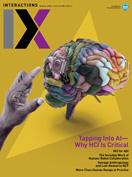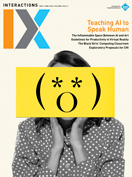Authors:
Regan Mandryk, Cliff Lampe, Aaron Quigley
The CHI conference is considering structural changes, including a future move to a five-day event (Monday to Friday) that will provide paper sessions half the day and interactive content, in five tracks, the other half. Exhibitor booths will be replaced with better formats for sponsor engagement.
Our starting point for discussion of the conference format changes was driven by two main factors: finances and format. The CHI conference has made significant budget cuts over the past decade by removing services and turning to volunteer and author labor that has a cost to our community and volunteers; additional budget cuts have required removing conference elements.
Beyond the financial issues, the format of CHI keeps scaling to accommodate our growth. We keep adding parallel tracks, resulting in a bloated, overwhelming, and often difficult-to-navigate program with little structured networking time or time for discussion of content or ideas—we have lost the "confer" part of our conference. To inform our discussion of changes to CHI's format, we had several open meetings last year and conducted a broad survey of CHI participants.
Our solution is to spend half the day learning about the state of the art in HCI through paper presentations of refereed content. In the other half, we construct the future together through interactive content—workshops, SIGs, panels, roundtables, provocations, mentoring events, student competition venues, other discussion formats, and posters—venues that would be reviewed [1]. This would have the benefit of increasing time available for conferring in structured formats and also increasing the time for discussion around each paper. This would necessarily decrease the time in the schedule devoted to paper talks, however. At our January 2024 meeting, the CHI Steering Committee voted in favor of the following motions:
By leaving half of the day for interactive content, we move the preconference interactive events into the main conference program.
Proposal 1: CHI moves to five days, from Monday to Friday. By removing the weekend program, we reduce the cost of the venue rental. By leaving half of the day for interactive content, we move the preconference interactive events (e.g., workshops, doctoral consortium) into the main conference program.
Proposal 2: CHI removes schedule conflicts between paper sessions and all other sessions. We devote half of each day to paper presentations, which allows for greater parallelization and supports attendees in not having to choose between attending paper presentations and attending the interactive elements such as panels and posters, which are harder to access after the conference. This also promotes the discussions that come from seeing state-of-the-art content.
Proposal 3: CHI non-paper contributions are bundled into five flexible conference tracks. These include workshops, panels, meetups, extended abstracts, and interactive demonstrations that focus on building community and cocreating the future of the field. In the other half of the day, there are a variety of structured networking events that support people at various career stages to access and contribute to the CHI conference in myriad ways. These interactive events are bundled to better streamline the conference program, reducing bloat, supporting a smaller organizing committee, and reducing the amount of professional organizing support, which is one of our major budget line items.
Proposal 4: CHI sunsets exhibitor booths, but provides new opportunities for sponsor engagement (e.g., invited talks). By removing the exhibitor booths, we expect to see major savings. To replace the industry engagement generated by the booths, CHI will turn to sponsored talks, which have proved to be very popular in the past few years and will also innovate new ways of highlighting our relationship with industry partners.
Proposal 5: CHI redesigns the career development opportunities for doctoral students and early-career researchers to be more inclusive. One of the ways in which we want to improve the CHI experience is to provide better, more inclusive, and accessible career-development opportunities for doctoral students and early-career researchers.
Proposal 6: CHI retains the student research competition in a format that meets the ACM requirements. Although the other student competitions will no longer be offered, we are committed to continuing with the student research competition (SRC), as our winners attend the ACM-wide SRC and represent the field of HCI in the larger field of computing. The SRC will be integrated into the Extended Abstracts track of CHI.
Proposal 7: The CHI Steering Committee moves to multiyear balanced conference budget planning.
Conference budgeting varies dramatically between North America and the rest of the world. This cost is why the CHI conference had a standard rotation of East Coast North America, Europe, West Coast North America, Asia, Wildcard until 2022. When held in North America, CHI conferences could "save" money that could be "invested" into locations where venues are more expensive. In 2022, the rotation was changed to North America, Asia, Europe, Wildcard to better reflect the geographic location of CHI attendees and widen participation for attendees from a range of locations.
We understand that change is sometimes difficult or even unwelcome. We need to streamline the conference experience to ensure we are providing an experience for attendees that is worth the cost of registration and travel, is a responsible choice in the face of the carbon costs of air travel, and that responsibly manages the efforts of our volunteers.
We invite you to share your thoughts with us. You can join us at CHI '24, where we will have a community panel on the topic (tentatively scheduled for the session preceding the CHI Town Hall). We will host an online community session after the conference. You can also reach out to any member of the CHI Steering Committee (cacl@umich.edu) and share your feedback. We are excited by these changes and look forward to discussing them with you as we evolve the CHI conference experience in the very near future.
Note: A longer version of this article is available at: https://chi.acm.org/finances-and-format-proposals/.
These ideas and descriptions have been generated by the CHI Steering Committee. In particular, contributors to this work are Caroline Appert, Simone Barbosa, Marta Cecchinato, Anna Cox, Katherine Isbister, and Geraldine Fitzpatrick.
1. These tracks would be "reviewed" according to ACM's definition (https://www.acm.org/publications/policies/pre-publication-evaluation). ACM considers refereed and formally reviewed material to meet the requirements of rigorous peer-review suitable for archival publications. As the tracks other than full papers are reviewed, it would not prevent future publication of those works in an archival venue. Also note that reviewing differs from refereeing in that there need not be written reports and statements for record.
Regan Mandryk is a professor of computer science at the University of Victoria, British Columbia, Canada. Her research explores the potential of digital games for social connection, emotion regulation, and mental health. She was general chair of the CHI conference in 2018 and chaired the CHI Steering Committee between 2019 and 2022. regan@acm.org
Cliff Lampe is professor and associate dean for academic affairs at the University of Michigan School of Information. His research is in social computing and in particular the effects of participation in social media. He was a general chair of the CHI conference in 2022 and has been chair of the CHI Steering Committee since 2022. cacl@umich.edu
Aaron Quigley is science director and deputy director of CSIRO's Data61 and adjunct professor in the School of Computer Science at UNSW Engineering, Australia. He is an ACM Distinguished Scientist and former co-chair of CHI 2021 and chair elect of the CHI Steering Committee. His research interests include discreet computing, global HCI, pervasive and ubiquitous computing, and information visualization. aquigley@acm.org
Copyright held by authors
The Digital Library is published by the Association for Computing Machinery. Copyright © 2024 ACM, Inc.









Post Comment
No Comments Found